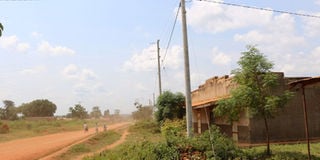Prime
Power agency turns to use of concrete poles

Pilot project. Concrete poles erected by REA on Serere Road in Soroti Municipality. PHOTO SIMON PETER EMWAMU
What you need to know:
According to Ms Litho, the concrete poles will limit power outages caused by falling wooden poles.
Rural Electrification Agency (REA) has started phasing out wooden electricity poles in favour of concrete ones.
The agency has started piloting the use of concrete poles in east, north eastern and northern parts of the country after registering multiple letdowns in the use of the wooden ones.
The concrete poles, whose advantage is their long life span of more than 40 years, are being manufactured by Concrete Pole Plant, East African Concrete Plant and Entech Limited. The companies manufacture the poles with metallic rods to ensure durability.
Kotido District that is yet to be connected to the national grid, is among other districts in Karamoja sub-region where the poles have been erected, with Kaabong District currently under survey.
Ms Patricia Litho, the head of communication and community affairs at REA, said the concrete poles will soon cover the whole country.
Pilot project
“It is a pilot project we are doing in eastern and northern regions after failure in use of wooden poles in the recent past,” she explained on Tuesday.
Ms Litho added that wooden poles are lately failing because of the scarcity of the indigenous tree species from which the poles would be made.
“The new trees species reach the recommended diameter when they are still immature and not strong enough to withstand storms, floods and wildfires. It is from this point of view that the use of precast concrete poles is being piloted,” she explained.
“We have lost a number of poles to wildfires, floods along the Soroti-Moroto road unlike in other regions of central and western Uganda, which have mild fires and floods,” Ms Litho added. She said concrete poles last a minimum of 40 years compared to the wooden ones which nowadays start rotting in less than 10 years.
Mr Cosmas Elotu, the director for Soroti Concrete Pole Plant, added that the demand for the concrete poles is high in Uganda and the neighbouring Kenya given the weather vagaries and high maintenance costs of wooden poles. “It’s one way we can preserve our tree cover. We have hard rocks that can be used for many years to come. It is an initiative that is environment friendly, and gives jobs to quite a section of persons,” said Mr Elotu, who is also the Dakabela County MP.
According to Ms Litho, the concrete poles will limit power outages caused by falling wooden poles.
However, Mr Samson Opus, a tree grower in Bukedea District, said the adoption of concrete poles will force them out of business.
“We planted these trees to supply power distribution and construction companies but now with the concrete poles taking precedence, I don’t know what the future holds for us,” he said.
Umeme follows suit
Farmers. Electricity distributor Umeme Ltd has also said in the near future, they will do away with wooden poles to save the environment by reducing on the cutting down of trees.
Umeme Board chairperson Patrick Bitature, speaking at the company’s annual general meeting in May, said concrete poles last longer than wooden poles.
“Concrete poles last more than 50 to 60 years. Wooden poles, when erected in a swampy area can’t last more than 10 years. This new measure will also help us on the loses we have been encountering by redoing the networks,” said Mr Bitature.




